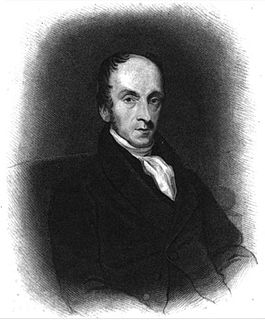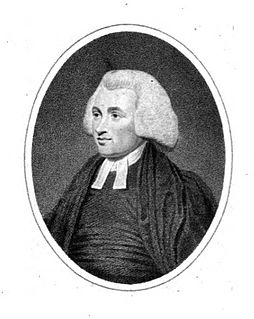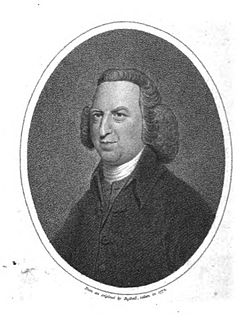
George Whitefield, also known as George Whitfield, was an Anglican cleric and evangelist who was one of the founders of Methodism and the evangelical movement.
Trefeca, located between Talgarth and Llangorse Lake in what is now south Powys in Wales, was the birthplace and home of the 18th-century Methodist leader Howell Harris. It was also the site of two Calvinistic Methodist colleges at different times; the first sponsored by Selina, Countess of Huntingdon in the late eighteenth century; the second supported by the Welsh Calvinistic Methodist Connexion in the later nineteenth century.

Richard Watson (1781–1833) was a British Methodist theologian, a leading figure of Wesleyan Methodism in the early 19th century.

The Countess of Huntingdon's Connexion is a small society of evangelical churches, founded in 1783 by Selina Hastings, Countess of Huntingdon, as a result of the Evangelical Revival. For many years it was strongly associated with the Calvinist Methodist movement of George Whitefield.

William Romaine, evangelical divine of the Church of England, was author of works once highly thought of by the evangelicals, the trilogy The Life, the Walk, and the Triumph of Faith.
Calvinistic Methodists were born out of the 18th-century Welsh Methodist revival and survive as a body of Christians now forming the Presbyterian Church of Wales. Calvinistic Methodism became a major denomination in Wales, growing rapidly in the 19th century, and taking a leadership role in the Welsh Religious Revival of 1904-5.

Selina Hastings, Countess of Huntingdon was an English religious leader who played a prominent part in the religious revival of the 18th century and the Methodist movement in England and Wales. She founded an evangelical branch in England and Sierra Leone, known as the Countess of Huntingdon's Connexion.

William Aldridge was an English nonconformist minister.

The Rev. Samuel Eyles Pierce was an English preacher, theologian, and Calvinist divine. A Dissenter from the Honiton area, Pierce was an evangelical church minister aligned with Calvinist Baptist theology. He wrote more than fifty books and many sermons.

Henry Peckwell (1747–1787) was a Church of England clergyman of Methodist views.

John Eyre was an English evangelical clergyman. He helped in establishing some of the major national evangelical institutions.

Thomas Haweis (c.1734–1820), was born in Redruth, Cornwall, on 1 January 1734, where he was baptised on 20 February 1734. As a Church of England cleric he was one of the leading figures of the 18th century evangelical revival and a key figure in the histories of the Countess of Huntingdon's Connexion, the Free Church of England and the London Missionary Society.

Joseph Sortain (1809–1860) was a British nonconformist minister, an evangelical Independent, philosophy tutor at Cheshunt College, and biographer of Francis Bacon. A reputed preacher of his time, he was called "the Dickens of the pulpit" by John Ross Dix.

Thomas Wills (1740–1802) was an English evangelical preacher, a priest of the Church of England who became a Dissenter.

Joseph Benson was an early English Methodist minister, one of the leaders of the movement during the time of Methodism's founder John Wesley.
William Talbot, often called "Talbot of Kineton" after his first living Kineton in Warwickshire, was an evangelical clergyman of the Church of England.

Richard Conyers (1725–1786) was an English evangelical cleric, and the hymn-book compiler of a precursor to the Olney Hymns. He became well known as the parish priest of Helmsley in the North Yorkshire Moors, a cure of scattered villages.

William Alphonsus Gunn (1760–1806) was an English evangelical cleric.

South Street Free Church is a church in the centre of Eastbourne, a town and seaside resort in the English county of East Sussex. Originally Congregational, it is now aligned to the Countess of Huntingdon's Connexion—a small group of Evangelical churches founded by Selina Hastings, Countess of Huntingdon during the 18th-century Evangelical Revival. The church was founded in 1897 as an offshoot from an earlier Congregational chapel, and initially met in hired premises. Local architect Henry Ward designed the present church in 1903; the "characterful" and "quirky" Arts and Crafts-style building has been listed at Grade II by Historic England for its architectural and historical importance.